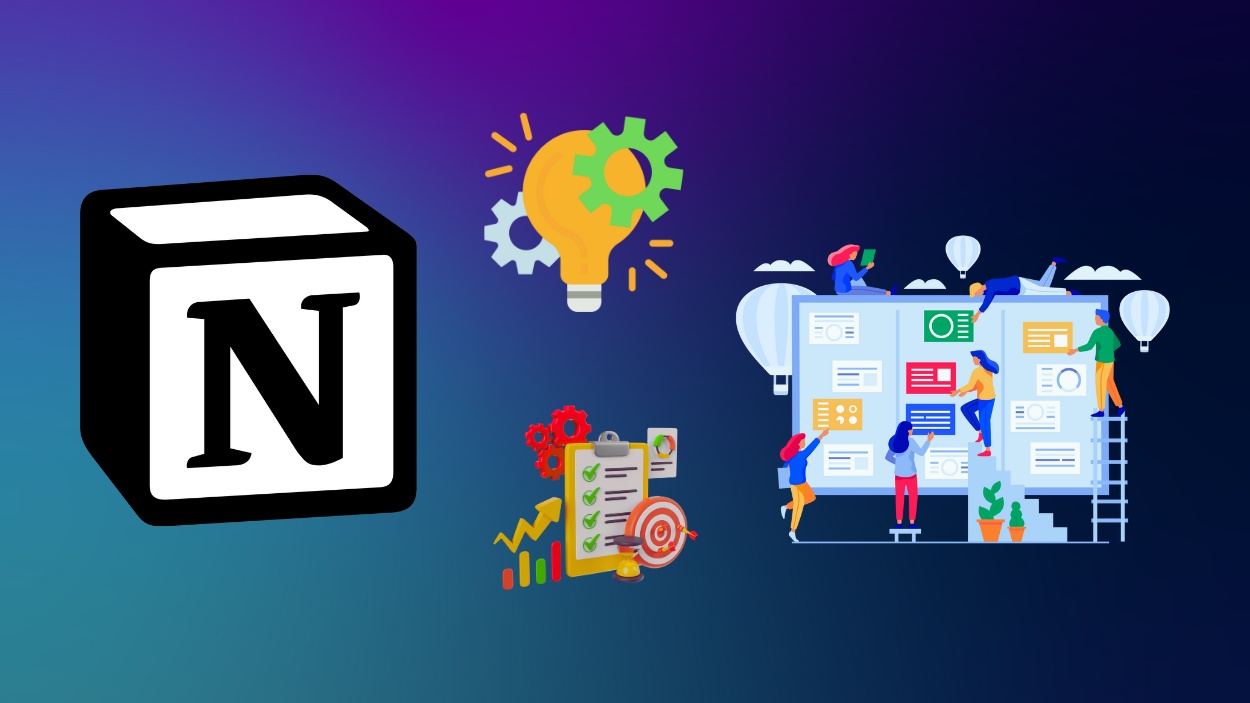Notion has become a powerhouse in productivity tools, reaching 100 million users globally, even surpassing several earlier milestones. Its impact spans from small teams structuring project workflows to large organizations like Fortune 500 companies managing collaboration, proving its versatility in real-world scenarios. And yet, there’s much more unfolding; dig into the full article to see the latest numbers and industry shifts.
Editor’s Choice
- Notion generated $400 million in annual revenue in 2024, a 60% increase over 2023’s $250 million.
- It crossed the 100 million users mark worldwide in 2024.
- The platform boasts over 4 million paying customers.
- The estimated company valuation stands at $10 billion.
- Notion raised around $352.7 million in total funding, including a $275 million Series D in 2021.
- Over 50% of Fortune 500 companies use Notion, including firms like Salesforce and Intel.
- As of 2025, Notion employs approximately 800 team members.
Recent Developments
- In April 2025, Notion released Notion Mail, an AI-powered Gmail client integrated with Notion AI for drafting and organizing messages.
- In 2024, Notion unveiled tools like Forms, Layouts, and enhanced automation workflows, including Formulas in Automations.
- The platform launched Notion Calendar in early 2024, tying calendar functionality directly to pages and databases.
- AI features now allow proactive suggestions, PDF analysis, and content drafting with deeper workspace context.
- Notion supports integration with 70+ SaaS tools, including Slack, GitHub, Zoom, and Typeform.
- Multi‑factor authentication and enhanced security measures were rolled out in 2023 across higher-tier plans.
- Expanded language support now includes Japanese, Korean, Spanish, and several Northern European languages.
Founder Ownership of Notion
- Ivan Zhao, founder of Notion, still owns 30% of the company.
- The remaining 70% is held by other investors and stakeholders.
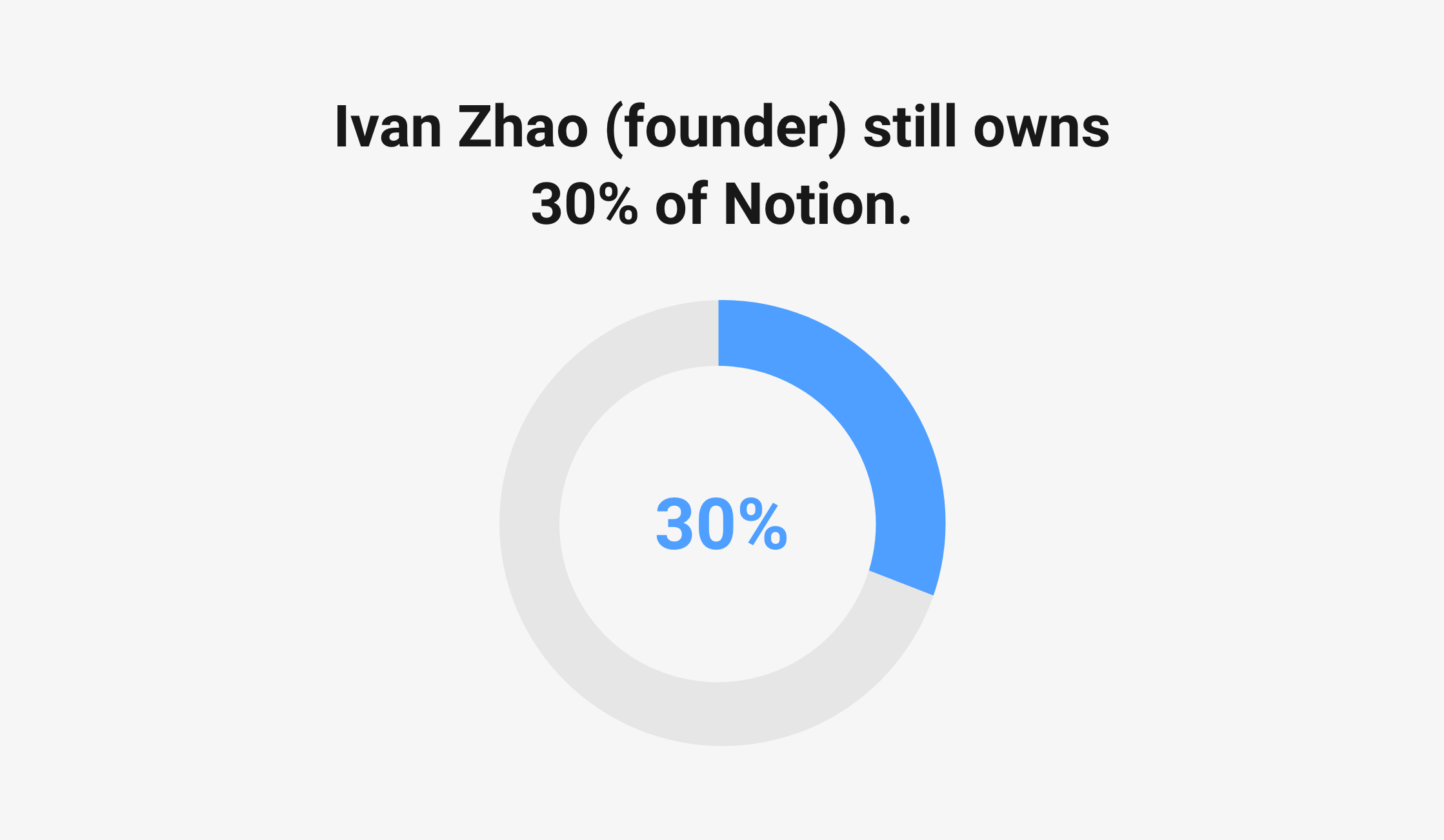
Paid Users and Subscription Rates
- Over 4 million paying customers use Notion.
- That equates to an approximate 13% conversion rate from users to paying customers.
- The active user base surged from 1 million (2019) to 30 million (2022–2024).
- Notion’s revenue model includes Free, Plus, Business, and Enterprise tiers.
- The Plus plan costs $10/user/month (annually) or $12/month if billed monthly.
- The Business plan runs $20/user/month (annually) or $24/month billed monthly.
- Enterprise customers receive advanced controls, SSO, audit logs, and workspace analytics.
- User sentiment has sometimes turned critical. Reddit discussions describe concerns about frequent plan changes and pricing shifts in 2024–2025.
Revenue and Financial Growth
- Notion earned $400 million in annual revenue for 2024, up from $250 million in 2023 and $67 million in 2022.
- That represents nearly 500% growth from 2022 to 2024.
- According to other sources, revenue is estimated at $300 million in 2024 vs. $3 million in 2019.
- Alternative figures suggest about $67.2 million in annual revenue, a 36% rise year-over-year.
- Regionally, 80% of users live outside the U.S., underlining global expansion.
- Monthly website visits reportedly exceed 150 million.
U.S. Productivity Management Software Market
- The market was valued at $14.4 billion in 2020.
- By 2021, it increased to $15.9 billion.
- The sector is projected to grow at a 13.5% CAGR from 2023 to 2030.
- Growth is driven by Content Management & Collaboration, Structured Work Management, AI & Predictive Analytics, and Other solutions.
- The market is expected to show steady expansion through 2030, fueled by digital transformation and enterprise adoption of productivity tools.
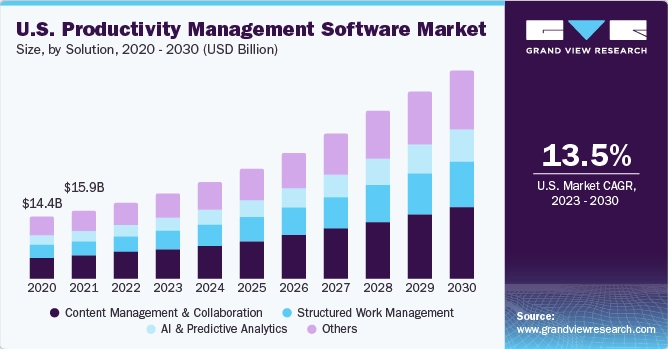
Funding and Valuation
- Total funding stands at roughly $352.7 million, led by a $275 million Series D in October 2021.
- Earlier investment rounds include $50 million in April 2020, $18.2 million in July 2019, and $9.5 million in 2016.
- Notion reached a valuation of $10 billion after the Series D funding.
- Valuation rose from $800 million (2019) to $2 billion (2020) and then to $10 billion (2021).
- Major investors include Sequoia Capital, Index Ventures, and Coatue Management, among others.
- Angel backers include high-profile names like Daniel Gross, Elad Gil, and Lachy Groom.
- Wikipedia confirms the $275 million Series D, $10 billion valuation, and 20 million users at that time.
Business Adoption
- Over 50% of Fortune 500 companies use Notion’s platform to unify their workflows.
- Notable enterprise customers include Amazon, Nike, Pinterest, DoorDash, Figma, Pixar, Robinhood, Uber, Snowflake, Toyota, and more.
- Notion’s adoption spans small businesses to large enterprises, addressing a wide range of organizational needs.
- The shift toward using Notion as a central workspace helps teams eliminate the need for multiple tools, tackling what Notion calls “tech bloat”.
- Expansion into APAC, especially Australia, is a strategic focus, where Notion addresses a substantial $228 billion annual productivity loss due to inefficient workflows.
- The company emphasizes a B2C2B model, where personal use often leads to workplace-wide adoption.
- The community’s rich ecosystem of templates and shared use cases fuels enterprise confidence and aids adoption.
Spending Preferences for Better Time Management
- 32% of all respondents would spend money to save 5 minutes, compared to just 3% of time-tracking users.
- 42% of all respondents are willing to pay for saving 10 minutes, while only 14% of time-tracking users would.
- 23% of time-tracking users would pay to save 15 minutes, higher than the 16% of all respondents.
- 21% of time-tracking users value saving 20 minutes, versus only 6% of all respondents.
- 28% of time-tracking users would pay to save 30 minutes, compared to just 1% of all respondents.
- 6% of time-tracking users and 1% of all respondents stated they don’t want to manage their time better.
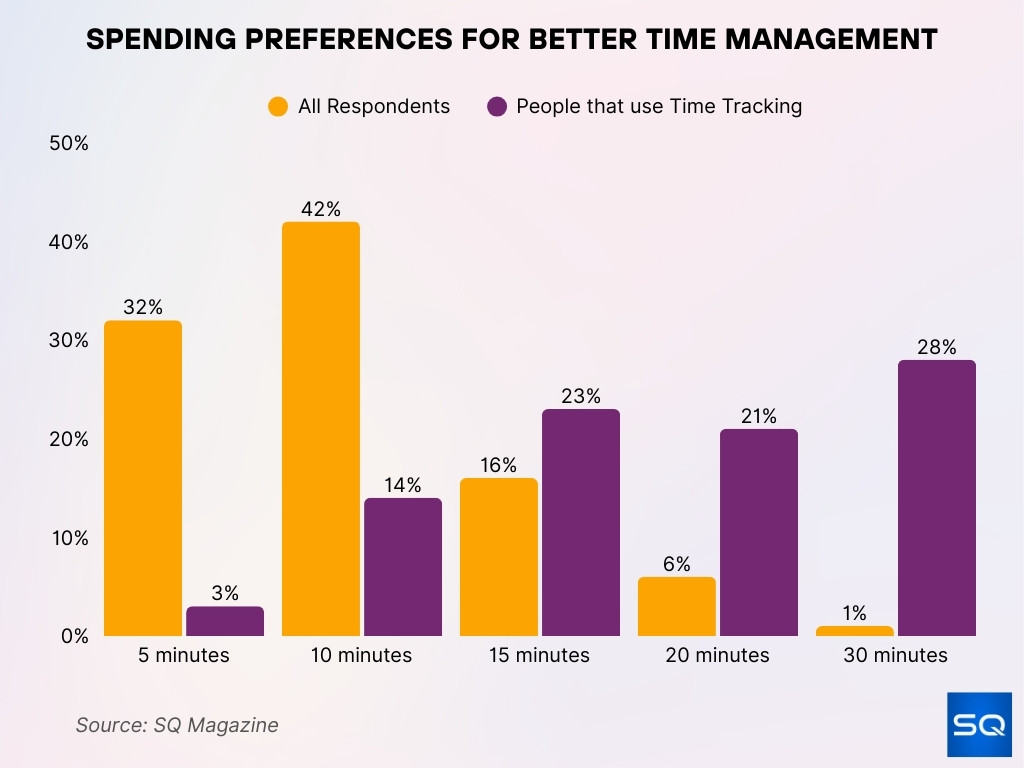
Competition and Market Position
- Notion’s 100 million users place it among the leading collaboration platforms, despite competitors like Evernote (225 M users) still holding a broader base.
- Its flexibility and community ecosystem often outshine competitors, especially in enterprise rationalization of tool stacks.
- The “all‑in‑one workspace” model positions Notion ahead of point solutions such as Trello or Monday.com, helping teams reduce app switching.
- Notion’s focus on AI-powered customization and integration sets it apart from legacy note-taking tools.
- Its product-led growth strategy, backed by community templates and organic adoption, drives market expansion without heavy paid marketing.
- Expansion into APAC shows strategic targeting in regions where digital productivity growth is accelerating.
Productivity and Collaboration Impact
- Teams using Notion report significant reductions in tool switching, consolidating multiple workflows into one centralized system.
- Notion’s integrations with 70+ tools (e.g., Slack, GitHub, Zoom, Jira) enhance collaborative workflows.
- The AI features now support context-aware suggestions, PDF analysis, and drafting efficiencies, boosting productivity directly within Notion.
- After adopting Statsig, Notion ramped up from single-digit experiments per quarter to over 300, enabling fast-paced improvement cycles.
- Through experimentation, Notion has improved sign-up, activation, engagement, and retention metrics via controlled testing.
- One engineer handles integration and data metrics with Statsig in just 5% of their time, compared to what used to require a four-person team.
- Notion’s AI enhancements and automation make collaboration not just easier but more intelligent and responsive to team needs.
Global Reach and Geography
- Geographic distribution in July 2025: 16.2 % USA, 11.98 % South Korea, 10.86 % Japan, 6.83 % Brazil, 4.28 % France.
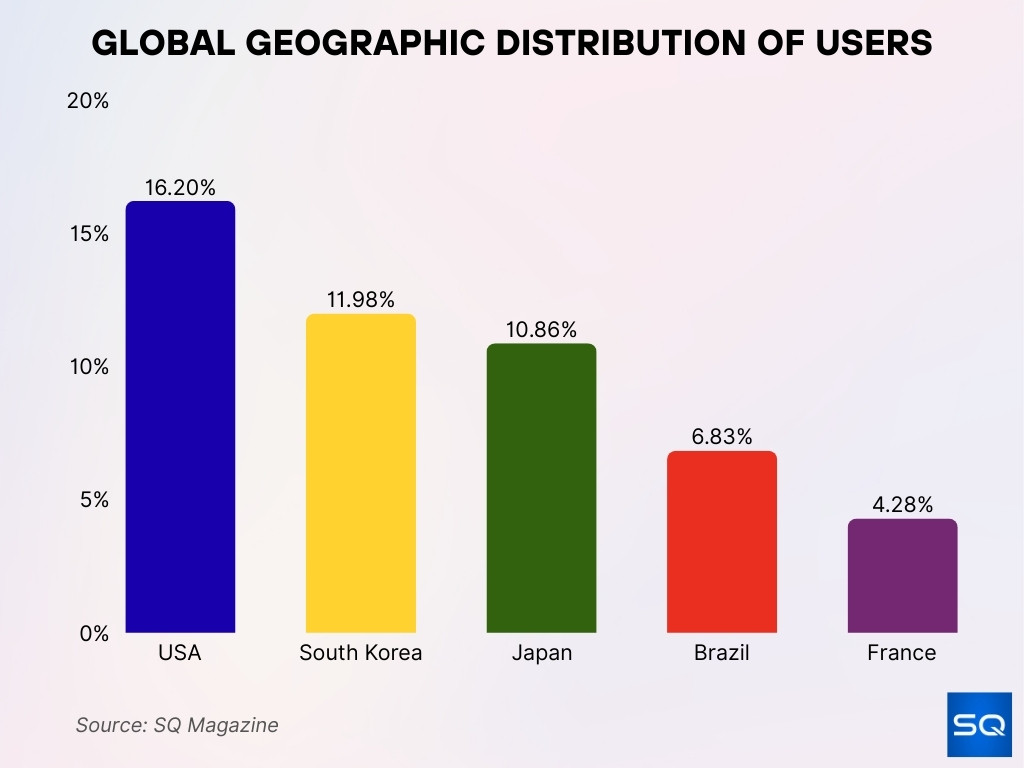
- Over 80% of Notion’s users are located outside the U.S., highlighting broad international appeal.
- In 2021, Notion was used across 28 countries and saw 4× growth in daily active users globally.
- Other leading markets include Japan, South Korea, Brazil, France, the U.K., Canada, and India.
- Notion’s style, modular and customizable, resonates globally, likened to building with Lego blocks.
- The APAC region, particularly Australia, is a strategic growth focus, where workflow inefficiencies cost the economy $228 billion annually.
Website Traffic and Usage
- In July 2025, notion.so logged 134.12 million visits, up 21% from June, with average session durations of 12 minutes 47 seconds.
- Similarweb estimates for the same period show 170.1 million total visits, 10.72 pages per visit, and an average duration of around 9 minutes 14 seconds.
- Bounce rate is relatively low at 25.05 %, indicating engaged users.
- Engagement remains high, 6.53 pages/visit, and strong session times suggest active exploration.
- Notion’s organic traffic dominance stands at around 95%, demonstrating strong brand recall and inbound reach.
- Consistent month-over-month growth (e.g., +9.3% total visits) underscores a healthy upward trend.
Workspace Analytics
- Notion’s enterprise dashboard provides a managed users control panel, offering visibility into employees, domains, session durations, and access control.
- The platform now supports an organization layer to oversee multiple workspaces, improving admin compliance and governance.
- Admin tools allow bulk user management, content access restrictions, and workspace-level user monitoring.
- Workspace analytics help organizations monitor usage patterns, collaboration trends, and policy adherence centrally.
- New importers and integration improvements simplify migrating legacy systems into Notion environments.
- Enterprise-ready upgrades include enhanced security, compliance, and admin scalability.
Content and Page Analytics
- Notion itself doesn’t publicly publish granular metrics on individual pages or content analytics.
- However, enterprise features like auditing, usage logs, and user activity monitoring imply built-in analytics focused on user behavior and content engagement.
- Organizations can likely track metrics like page views, edits, and access patterns via admin dashboards.
- Enhanced compliance tools suggest monitoring of user behavior, content movements, and audit trails for accountability.
- Custom dashboards via API or integration (e.g., with BI tools) may allow organizations to roll up content analytics.
- Notion’s ongoing development in this area remains focused on improving visibility and oversight for enterprise customers.
Team and Member Activity
- As of early 2025, Notion has around 800 employees, reflecting the gradual scaling of operations.
- Other sources suggest staff numbers may approach 900 or nearly 1,000, based on comments from CEO Ivan Zhao.
- A different estimate from LinkedIn indicates up to 4,800 employees, though this may include contractors or affiliates.
- The leadership sets a preference for small, highly capable teams, as Zhao explained, “The small bus can turn corners much better”.
- Quicker iteration cycles allow tight-knit teams to build and improve AI features rapidly.
- Contributor networks, including “Notion Ambassadors,” enable distributed support across communities.
- Growing team size supports functions like AI development, integrations, analytics, and international expansion.
Product Updates and Innovations
- In January 2024, Notion launched Notion Calendar, fully integrated with databases and scheduling.
- In February 2024, Notion acquired Skiff, enhancing email and privacy capabilities.
- Under the “Make with Notion 2024” event (October 2024), the company introduced Forms, Layouts, and expanded Automation workflows with formulas.
- April 2025 saw the release of Notion Mail, an AI-powered Gmail client with drafting, search, and scheduling features.
- AI features now include workspace-context suggestion, PDF analysis, and chat-driven responses.
- Advanced integrations extend to Cron, FlowDash, and partnerships with Slack, GitHub, Google Drive, AWS, Asana, Figma, and Typeform.
- Security updates include multi-factor authentication, SSO, and enterprise-grade audit logging.
Acquisitions and Investors
- Notion has raised approximately $352–353 million in funding, including a $275 million Series D in October 2021.
- Valuation saw rapid climbs, from $800 million (2019) to $2 billion (2020), then $10 billion (2021).
- Key investors include Sequoia Capital, Index Ventures, Coatue Management, and angels such as Daniel Gross and Elad Gil.
- Notion acquired Automate.io (2021), Cron (2022), FlowDash (2022), and Skiff (2024) to strengthen features and diversification.
- Acquisitions demonstrate Notion’s approach, expanding the productivity toolkit through strategic acquisition and integration.
- Investors have backed Notion’s commitment to AI, modular tools, and enterprise expansion.
Company History and Milestones
- 2016, Notion 1.0 launched after being founded in 2013, named Product Hunt’s top product of day/week/month.
- 2018, Notion 2.0 rolled out, again topping Product Hunt charts.
- 2019, the user base hit 1 million.
- 2020, Funding boosts valuation to $2 billion within eight months.
- 2021, Series D raised $275 million, the valuation jumped to $10 billion, with 20 million users.
- 2022, the Launch of the Notion Certified Program and capability enhancements around AI, acquisitions continue.
- 2023–2024, AI features expand, Notion Calendar, Forms, Layouts, and advanced Automation are introduced.
- 2024–2025, User growth scales to 100 million, global team and product portfolio expand rapidly.
Training and Internal Culture
- Notion developed a Notion Certified Program in 2022 to upskill users and developers.
- CEO Ivan Zhao emphasizes compact, high-accountability teams, “fewer, but more talented people.”
- Internal culture values speed and iteration, as exemplified by the rapid AI product development following GPT‑4.
- Though not public, formal training for internal staff (on AI, enterprise usage, etc.) likely mirrors Notion’s external certification structure.
- The “Notion Ambassadors” network showcases a community-driven culture for product promotion and learning.
- The company balances creative product flexibility (the LEGO metaphor) with rigorous internal excellence and design thinking.
Conclusion
Notion’s journey reflects dynamic growth, strategic expansion, and innovation. From its humble startup roots to achieving 100 million users and a $10 billion valuation, it has redefined productivity tools. AI-driven features, thoughtful acquisitions, and community-led product growth, paired with lean, expert teams, tell a story of adaptability and vision. As Notion further globalizes, enhances enterprise offerings, and empowers diverse use cases, it stands poised to shape how teams create, collaborate, and scale for years to come.

